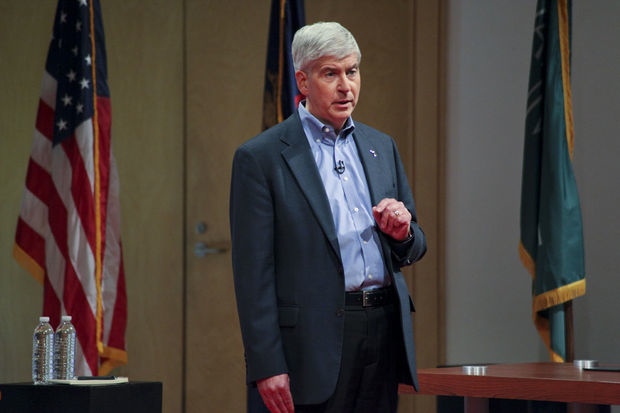No debates? As long as candidates get a vote, get used to it
An annual election year ritual is columnists and editorial writers lecturing candidates and their handlers about their civic duty to engage in candidate debates and town halls.
I agree. As a citizen, voter, policy wonk and political junkie, I think candidate debates give us a good vehicle to compare and contrast candidates and their positions.
As imperfect as they are, they can be a valuable part of our democratic system. And for most of us with our mind already made up, they can be good political theater where we cheer for our candidate and jeer the dufus the other party put up.
But state candidate debates, modeled after the presidential debates, are fewer and fewer in Michigan. As Carol Cain, Detroit Free Press columnist put it: “Circle 2014 as the year debates morphed into irrelevancy as a path to getting elected in Michigan’s two major statewide races.”
A political consultant said: “The problem with debates is that they just don’t matter. There is no real benefit even to the public. They’re old. Gone. Dying. Dead. The goal is engagement. Conversation. Discussion of ideas.”
So, why won't all candidates debate? Because their goal is to get elected to office, not assuage editorial writers. A candidate and his or her managers have a limited number of tools and resources to win. If they believe a debate or town hall helps them win, they will accept. But, both candidates have their own strategies and both have to agree to the number, terms, format and a myriad of other issues before debates will be scheduled. (Full disclosure: I worked as debate negotiator for the Terri Lynn Land Senate campaign, for Dick DeVos in 2006 and was chairman of the GOP primary debate commission in 2010.)
Former state representative and co-director of the Michigan Political Leadership Program Steve Tobocman has said “debates are only a thing of the past when politicians can get away with not having them. Candidates are avoiding debates because their political handlers and strategists are telling them to avoid the format. They see the debate as a very uncontrolled environment compared to carefully managed public appearances, television and radio advertising, and direct mail.”
From my experience, Tobocman is correct. Message control is key to most candidates and a debate is a risky undertaking.
There are many reasons a candidate avoids debates; here are some:
- I am way ahead. Why should I give my opponent exposure?
- I have enough money to control the message and do not want the risk of an unscripted blunder.
- The proposed moderators are clearly in the tank for the other party and I will not get a fair shake. Plus, they will try to make the debate about something I don't want talk about -- gun control, contraception, immigration – and not jobs and taxes. And the so-called "nonpartisan" group that wants to sponsor the debate is really a front group for (pick one: the unions or the Koch Brothers).
- I have a face for radio.
- We have fundamental differences on format. She wants a town hall so she can show off. I want a reasoned discussion of the issues with a moderator-led panel of knowledgeable reporters.
- My opponent is a liar and dissembler. I am a straightforward, honest, American all around good guy. My opponent will not enlighten the public but will further coarsen our political system and encourage the worst in human nature. I could go on.
Debates are a giant time suck and I have a fully committed schedule to meet with my base supporters and turn them out in the election. I just don't have the time to indulge the media's desires.
One perennial proposal to encourage candidates to debate is a Michigan Debate Commission as a few other states have done. Since 1987 there has been a Presidential Debate Commission to organize debates independent of the campaigns. The Commission has gained such prestige within the national electoral process that candidates are unable to avoid participation. The Indiana Debate Commission web site claims: “Fact: No candidate has declined.”
The Detroit Free Press quotes John Truscott, a Republican strategist: “A debate commission is worth exploring but it’s very difficult in a highly charged political environment to find folks that both sides will trust. And that trust factor is crucial to actually getting debates and debate rules on the table.”
If people are serious about having debates in 2016, now is the time to try and build a consensus.
See what new members are saying about why they donated to Bridge Michigan:
- “In order for this information to be accurate and unbiased it must be underwritten by its readers, not by special interests.” - Larry S.
- “Not many other media sources report on the topics Bridge does.” - Susan B.
- “Your journalism is outstanding and rare these days.” - Mark S.
If you want to ensure the future of nonpartisan, nonprofit Michigan journalism, please become a member today. You, too, will be asked why you donated and maybe we'll feature your quote next time!


 It was a race for the highest office in the state, but voters only had one chance to see both candidates onstage talking unscripted. Gov. Snyder appeared with Mark Schauer at a single town hall-style event. (Photo by Elaine Cromie, MLive; used with permission)
It was a race for the highest office in the state, but voters only had one chance to see both candidates onstage talking unscripted. Gov. Snyder appeared with Mark Schauer at a single town hall-style event. (Photo by Elaine Cromie, MLive; used with permission)